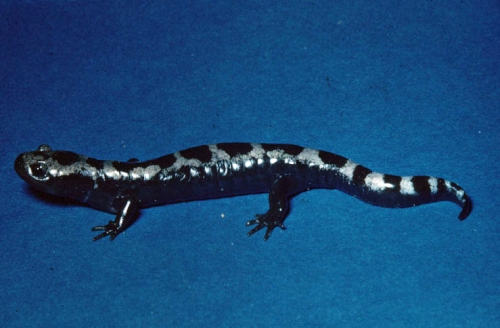Marbled salamanders are black with white splotches and bands giving them a marbled appearance.
Marbled salamander gender.
The male has white bands and the female has gray bands.
The marbled salamander has white or gray crossbands on a dull black body.
Newly transformed young have brown to black ground color with light speckles.
This species is sexually dimorphic males tend to have white crossbands and females tend to have gray silvery crossbands.
Bands generally do not reach the black underside.
Like most of the mole salamanders it is secretive spending most of its life under logs or in burrows.
Adults can grow to about 11 cm 4 in small compared to other members of its genus.
The marbled salamander is a stocky medium sized salamander marbled salamanders reach an adult size of 3 5 to 5 inches in length.
The marbled salamander is one of many amphibians found in the bottomland hardwood forests of mississippi.
A small stout bodied salamander this species is easily identified by its distinct black and white patterning across its entire body.
Photo by kevin stohlgren.
Marbled salamander in boone county.
Band width varies and bands may merge form circles on the back or have gaps.
They can live between11 14 years if properly cared for.
The bands of females tend to be gray while those of males are more white.
Found her under a log along with 3 stag beetle larvae.
They typically grow to about 4 inches long.
Habitat and tank requirements.
They are gray to black in color with silvery white cross bands on males and grayish cross bands on females.
How to setup a simple but effective terrarium for a marbled salamander or any salamander that requires cool temperatures and moist conditions.
Marbled salamander ambystoma opacum description.
The marbled salamander is a stocky boldly banded salamander.
This and many other amphibians require small fishless woodland.
Most michigan salamanders begin breeding in the spring months with a few exceptions.
Marbled salamanders grow to about 3 5 4 25 in 9 10 7 cm in size and are stout bodied and chubby in appearance.
They can be identified by their black dark brown body including its venter with light white silvery crossbands on the dorsum.
It may also occur in open sandy woods and on rocky dry hillsides.

